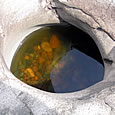Different Approaches to Health and Wholeness
by Heron Saline, CHT CMT ©2007
These days one often hears the words "alternative" and "holistic" used interchangeably, but since they don’t mean the same thing, it’s important to understand what they actually refer to in order to get the services and results you really want! Most of us have grown up with Allopathic (Standard Western) Medicine, which offers some powerful technologies. Much Standard Western Medicine takes the perspective of addressing a specific, problematic illness or condition — a focus on deficits rather than a magnification of assets.
"Alternative" refers to modalities which are not generally part of Standard Western Medicine. They are often very specialized and innovative ways to effect change in a part of a person such as the physical body, mood or emotional health, thoughts, energy field or spirituality, etc. As evolutionary steps in treatment, Alternative techniques often have advantages such as less negative side effects, gentleness, and alignment with natural life processes, that standard Western techniques may or may not manage.
"Holistic" specifically means an approach that works with the person as a whole. And that’s wonderful, because it is as whole beings that we change, grow, and heal! Not all alternative practices work with the client as a whole person and are therefore not Holistic. Most of the time alternative and holistic approaches focus on cultivating wellness rather than on a problem to which they are responding. In other words, they identify, cultivate and magnify what IS working well into the integrated whole. Often several alternative modalities are used in combination for truly holistic work. And of course it may be possible to complementarily use the strengths and benefits of Standard Western technologies with those of Alternative approaches.

What seems to be getting clearer and clearer each year is that in order to create lasting change (such as shifting a habit or healing a medical condition), most if not all parts of a person must be engaged in the change. So what parts of a person am I talking about that make up the "whole"? Most holistic teachings include the physical body, the emotions, the mind, the spirit (or attitude, or energy), and sometimes the will (conscious or unconscious intent and motivation).
Addressing all of these aspects of a person as they relate to one specific part of their life can happen at a deeper-than-conscious level, but these days more and more people are doing that deliberately with powerful results. While some conditions can be addressed effectively from an outside-in (or "fix me") stance, holistic approaches especially lend support to the person participating actively in creating their own wellness. And many emotional and medical conditions seem to require that participation to shift and heal — we’re not machines that need new parts from time to time: feeling well should really mean feeling well!
As for the concept of wholeness, I think of the body, emotions, mind, spirit, and will as five points on the perimeter of a strong and beautiful web of interconnection. There is a line from each directly to the other four, and together all the lines form a network that makes up the whole person. The interesting thing about this relationship of all our parts is that they affect one another! So if a person wants to lose weight, he must of course deal with physical body elements of that (such as diet and exercise), but there may also be a connection from emotions (such as fear of being rejected, or frustration with busyness, or sadness around a former relationship) to the appetite and energy level. Same goes for thoughts (such as memories and beliefs about eating), and spiritual concerns (such as faith in possibility of change, or doubt about ability to lose weight). An example of an issue of the will might be complete understanding and ability of the steps needed, but a lack of motivation to take them — any of these can set up a block to a valiant attempt at establishing new physical habits in diet and exercise that might sabotage the narrower effort. When we work with the whole person, we more often get the results we want, and often additional, unexpected benefits of growth, power, freedom, and development!
Ask your physician or health practitioner about their training and ability to work with ALL of you. That goes for alternative practitioners, too. Are they willing and able to work with you holistically? In what forms? Is there more to achieving the change you want that needs to be fleshed out in your treatment plan — (…a Hypnotherapist to work with the mental aspects of cancer while a patient is receiving medical care? …a Spiritual Coach to support someone in staying positive while they get ‘unstuck" from years of unresolved grief? …a bodyworker/masseur to help with relaxation, physical ease, and stress management while a Psychotherapist assists in moving through addicitive behaviors to health)? If their training doesn’t encompass all of you, can they collaborate with someone who can address the other parts of you for optimally effective and lasting results?
I wish you wholeness and success in reaching all your health goals.
# ~ # ~ #
List of some (among many wonderful other) approaches per domain:
PHYSICAL BODY: Western medicine, Acupuncture, Massage, Cranio-sacral, OrthoBionomy, Feldenkrais, Network Chiropractic, Homeopathy, Breema, Spas
THOUGHTS: Hypnotherapy, NeuroLinguistic Programming, Personal Thinking Patterns/Learning Strategies, Psychism
EMOTIONS: Psychotherapy, Energy Psychologies (Emotional Freedom Techniques, TAT, BSFF)
SPIRIT/ATTITUDE: Shamanism, Pastlife Regression, Life Between Lives, Channeling
WILL/INTENTION: Motivational Training, many of the mental/emotional modalities
CROSS-DOMAIN: Reiki, Personal Coaching, Acoustic Massage, Ayurvedics, Herbalism, Nutrition, Energy Medicine
| Call Heron at 415-706-9740 about this article… | To forward this article to a friend… |
- back -
